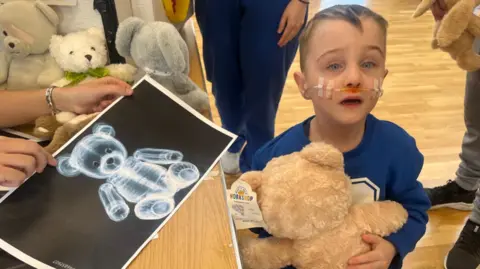Teddy bear hospital helps sick children overcome fears
 BBC
BBCA teddy bear hospital in Londonderry is helping children with complex medical needs overcome their anxiety about treatment.
At the mock-up hospital, children get to take their trusted teddies through a number of clinical settings to see how procedures and equipment are used on their bears.
Four-year-old Tiernan, who weighed just over 1lb at birth and has had to undergo numerous operations, was among the first children to bring their teddy bears along when the hospital opened its doors at the city's Waterside Shared Village.
His mum, Chloe, said he can sometimes find medical settings challenging, adding that he can go into "meltdown" when visiting a hospital.

Tiernan now lives with pulmonary hypertension; a condition that affects the blood vessels that supply the lungs, and chronic lung disease.
Chloe told BBC News NI that she hopes the teddy bear hospital will help add "some fun" to Tiernan's care.
"This is about taking away that stigma of the hospital and nurses," she said.
"It will help for him and his sister not to worry about going to the hospital, thinking something bad is going to happen."

The teddy bear hospital initiative is the brainchild of a local parents' group, medical students, and the Western Heath and Social Care Trust (WHSCT).
"The idea is the children will ultimately become more comfortable and reduce their fears," Lisa Storey from the trust's health improvement team said.
"These are children who will be going through their medical journey for life, they will also have appointments and hospitalisations, and that can be quite debilitating if fears develop.
"This early intervention concept here is to reduce those," Ms Storey told BBC Radio Foyle's North West Today programme.

'Friendly faces'
Student doctors from Ulster University's medical school in the city are on hand to take the children through a range of play stations, showcasing different clinical scenarios.
That might be fitting a nasogastric tube or have a CT scan, Hope Barron from the school of medicine's child health society told BBC News NI.
She added that they had brought in children who are often in hospital and have a lot more "health anxiety".
"It's about coming in and seeing us medical students being happy friendly faces," she said.
Prof Louise Dubras from the medical school, added: "Through student projects such as the Teddy Bear Hospital, we see community focus and community impact right from when medical students join us.
"We are very proud of their leadership to establish a local branch of this UK-wide initiative which aims to improve children's experience of healthcare in hospitals by reducing their anxiety."
